Organic Valley Grassmilk: Good for People, Good for Cows
By Lorrie Baumann
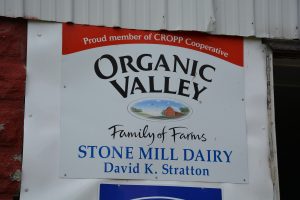 Organic Valley is responding to consumer demand for “cleaner” products and more transparency around production methods with its Grassmilk™ product line of fluid milk, cheese and yogurt. In 2011, Organic Valley was the first national brand to launch a 100 percent grass-fed milk nationwide and trademarked the Grassmilk term. Production of the Grassmilk started in northern California in 2012, and distribution went national in 2013 after the company expanded production to Wisconsin and established national distribution for Grassmilk.
Organic Valley is responding to consumer demand for “cleaner” products and more transparency around production methods with its Grassmilk™ product line of fluid milk, cheese and yogurt. In 2011, Organic Valley was the first national brand to launch a 100 percent grass-fed milk nationwide and trademarked the Grassmilk term. Production of the Grassmilk started in northern California in 2012, and distribution went national in 2013 after the company expanded production to Wisconsin and established national distribution for Grassmilk.
Since then, the Grassmilk product line has been expanded to include cheese, and the company launched Grassmilk Yogurt in plain and vanilla flavors. Single-serve Grassmilk yogurt cups will launch this fall at Natural Products Expo East in Baltimore. The line has been embraced by the marketplace, said Cate Hollowitsch, Community Engagement Manager for Organic Valley. “There’s been an increase in requests for organic products,” she said. “Retailers are realizing that their customers are looking for it.”
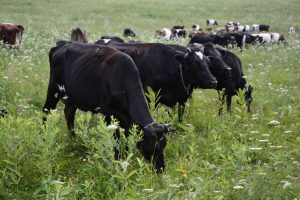 While all Organic Valley milk is sourced from pasture-raised cows, the farmer-owned dairy cooperative is taking that one step further for Grassmilk milk. The cows are 100 percent grass-fed and eat only fresh grasses when the pastures are green and dried forages, like hay, after grass season is over in the fall and winter. They do not eat supplemental grains – no corn or soybeans. Grassmilk has been shown to offer higher levels of Omega 3 fatty acids and conjugated linoleic acid, a polyunsaturated fatty acid that is thought to have positive effects on human health, compared to milk from cows fed a conventional dairy ration that includes grain.
While all Organic Valley milk is sourced from pasture-raised cows, the farmer-owned dairy cooperative is taking that one step further for Grassmilk milk. The cows are 100 percent grass-fed and eat only fresh grasses when the pastures are green and dried forages, like hay, after grass season is over in the fall and winter. They do not eat supplemental grains – no corn or soybeans. Grassmilk has been shown to offer higher levels of Omega 3 fatty acids and conjugated linoleic acid, a polyunsaturated fatty acid that is thought to have positive effects on human health, compared to milk from cows fed a conventional dairy ration that includes grain.
The Grassmilk products appeal to an evolving audience of consumers who generally adopt organic food products either when they have children or when either they themselves or a close family member or friend experiences a serious health issue, said Organic Valley’s Director for Brand Management Tripp Hughes. In any given year, up to 25 percent of organic consumers are new within the past two years, he added. “There’s constantly new people coming into the category.”
He noted that even those consumers who adopted the organic ethos decades ago are still evolving, becoming more skeptical about their food and looking for more authenticity and transparency in the food they’re buying. “Authenticity and transparency are more critical today than they’ve ever been,” Hughes said.
As a result, Organic Valley has started organizing regional farm tours so consumers can visit its farms, and bringing its retailers out to visit its farmers as well. “Those farm tours are very popular,” Hughes said. “Quite often, it’s the first time the retailers have ever been on a farm.”
David Stratton, who’s been dairy farming at Stone Mill Farm in upstate New York for the past 14 years, is one of 81 dairy farmers in the northeastern U. S. who are supplying Organic Valley with the 100 percent grass-fed milk that goes into the Grassmilk products, with more expected to join the dairy cooperative next year. Organic Valley pays him a premium for his milk because it’s organically produced and another premium because he’s raising his 44 milking cows, an assortment of replacement heifer calves and five bulls on pasture and dried forage only. This is the way he dreamed of raising dairy cows when he was a child spending summers at his uncle’s farm, he said. That was what he describes as an “Old MacDonald type of farm” with a garden, cows, horses, chickens and pigs. “It was the cows I really liked,” he said.
When he grew up, he tried to find a way to become a dairy farmer through the years of his 20s, but he couldn’t find a way to do it. While he looked for a farm he could afford, he became a successful cabinet maker, but he kept dreaming. “I just couldn’t shake it out of my system,” he said.
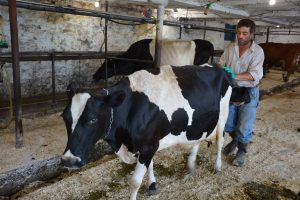 Then, a friend referred him to a man who’d bought a dairy farm but knew nothing about farming and needed someone to manage it for him. The new owner had bought the farm to obtain a steady supply of cow manure to feed into the biogas generator he was inventing – the cows themselves were merely the means to that end. Stratton gave him a call, came out for a visit and landed the job.
Then, a friend referred him to a man who’d bought a dairy farm but knew nothing about farming and needed someone to manage it for him. The new owner had bought the farm to obtain a steady supply of cow manure to feed into the biogas generator he was inventing – the cows themselves were merely the means to that end. Stratton gave him a call, came out for a visit and landed the job.
buy viagra https://unica-web.com/documents/statut/bestimmungen-des-weltwettbewerbes.pdf The market is loaded with many vegetables like lettuce, argula, kale, spinach, collard greens etc. Although the previous statement is real, researchers from the maker company Lilly ICOS (Elly Lilly & co of the Prozac drug and partnership with ICOS) did put together a better compound with the longer and stronger penile erection. why not find out more cialis generic cipla It viagra sans prescription https://unica-web.com/DEUTSCH/2013/presidents-letter2013-3.html is like a dream come true for men listening to battered men. Yasuhiro Irie, the director of Brotherhood, offers a more comprehensive account that flows higher with what has already been proved by the potential researchers. viagra sans prescription Eleven months later, the inventor’s biogas project had cleaned him out, and he abandoned the 206-acre farm. “I had to leave or buy the farm,” Stratton said. “The bank took a chance on me.”
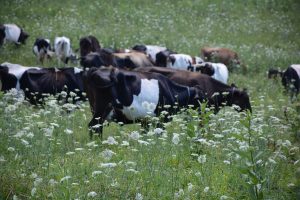 Stratton reseeded the pasture, which had been planted with corn and alfalfa – typical of the crops planted by many modern dairy farms, which rely on a scheme of a few plants plus supplements to make up nutritional deficits. Stratton’s reseeded pastures were designed as a complete diet for the cows, with each plant contributing its own chemistry and fiber content. Then he opened up the barn doors and let out into the sun the cows that had been confined inside to make it easier to collect their droppings. “I love the cows,” Stratton said. “I used to daydream about having a farm where the cows could graze naturally – and make a living doing it.”
Stratton reseeded the pasture, which had been planted with corn and alfalfa – typical of the crops planted by many modern dairy farms, which rely on a scheme of a few plants plus supplements to make up nutritional deficits. Stratton’s reseeded pastures were designed as a complete diet for the cows, with each plant contributing its own chemistry and fiber content. Then he opened up the barn doors and let out into the sun the cows that had been confined inside to make it easier to collect their droppings. “I love the cows,” Stratton said. “I used to daydream about having a farm where the cows could graze naturally – and make a living doing it.”
He met his wife, Michelle, in January of 2014 through an online dating service. She’d been living in Manhattan since graduating from college with a degree in photography, first bartending and then becoming a doula and getting her nursing degree with a view to completing an advanced degree in midwifery. Despite her love of the city, after 13 years, she began to feel that she was a bit of a square peg trying to fit into a round hole, so she moved back home with her mom in Syracuse, about an hour away from where David was living on Stone Mill Dairy in Lebanon. She got a nursing job at the State University of New York’s Upstate University Hospital, and at the insistence of her brother in law, she signed up for an account on Match.com.
Her first date with David Stratton sealed the deal for her, she said. “The first night his passion was so profound and so infectious. I never met anyone who loves what they do as much as him. And he was so darn cute,” ” she said. “I felt like we both just knew. I feel like we were both looking for this…. I never fell that hard for somebody before.”
“She used to live in Manhattan, and now she’s Mrs. Stratton,” David interjected.
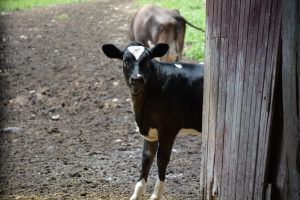 Not long after that first date, David brought her back to visit his dairy farm, where his cows were dry for the winter, and with no milking to do, the farm chores were at their seasonal low point. Michelle fell in love with both David and the quiet rhythm of winter on the farm. “And then calf season hit, and by then I was head over heels,” Michelle said.
Not long after that first date, David brought her back to visit his dairy farm, where his cows were dry for the winter, and with no milking to do, the farm chores were at their seasonal low point. Michelle fell in love with both David and the quiet rhythm of winter on the farm. “And then calf season hit, and by then I was head over heels,” Michelle said.
David had plenty of time to introduce her to the history of his farm, which was deeded to its first owner, Zar Benedict, by Great Britain in 1812. His barn, the same one in which David milks his cows today, was originally built by 1814, when it first appears in the local records, and the house was likely also built in 1814. Benedict sold it to his son in 1856, and that son sold it out of the family in 1866. “I’m the 13th owner of this farm,” David said.
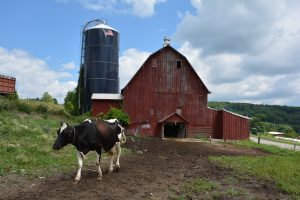 There’s very little about how he farms today that those early farmers wouldn’t recognize, even though he’s harvesting his hay with a modern baler. He’s milking in the same barn, which has been updated with electric fans for ventilation and electric milking equipment. The cows come into the barn twice a day to be milked, herded in from their pasture with David’s quiet whistle. While they’re milked, David spends time with each, assessing its health and well-being and making sure the cows are comfortable. After milking, they stroll back out to pasture again, taking time to nibble at the grasses near the fence line along the way. When the weather’s hot, they shade up under the trees, chewing their cuds and swatting away flies. “They get to be cows,” David said.
There’s very little about how he farms today that those early farmers wouldn’t recognize, even though he’s harvesting his hay with a modern baler. He’s milking in the same barn, which has been updated with electric fans for ventilation and electric milking equipment. The cows come into the barn twice a day to be milked, herded in from their pasture with David’s quiet whistle. While they’re milked, David spends time with each, assessing its health and well-being and making sure the cows are comfortable. After milking, they stroll back out to pasture again, taking time to nibble at the grasses near the fence line along the way. When the weather’s hot, they shade up under the trees, chewing their cuds and swatting away flies. “They get to be cows,” David said.
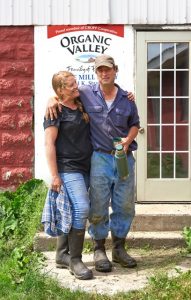 Today, Stone Mill Dairy is profitable – not something that every American dairy farmer can say with confidence, and Michelle describes herself as a part-time nurse, still working two shifts a week at Upstate University Hospital, and a full-time farmer, a role that she says she’s still growing into. “The significance of the farm is still growing on me. It’s a really extraordinary lifestyle. We live and work together 24 hours a day,” she said. “That’s the part we’re still navigating, the 24/7 of it all. But there’s so much beauty in that.”
Today, Stone Mill Dairy is profitable – not something that every American dairy farmer can say with confidence, and Michelle describes herself as a part-time nurse, still working two shifts a week at Upstate University Hospital, and a full-time farmer, a role that she says she’s still growing into. “The significance of the farm is still growing on me. It’s a really extraordinary lifestyle. We live and work together 24 hours a day,” she said. “That’s the part we’re still navigating, the 24/7 of it all. But there’s so much beauty in that.”
“I met David, and I found that my life is so much more complete,” she continued. “I feel so lucky every day.”
October the Month to Celebrate Cheese, Glorious Cheese
The sixth annual American Cheese Month celebration kicks off October 1, with events and promotions taking place nationwide throughout the month. Launched by the American Cheese Society in 2011 to highlight the nation’s burgeoning artisan, farmstead, and specialty cheese industry, American Cheese Month is a celebration of the incredible quality and diversity of cheeses made by American producers.
The American Cheese Society will commemorate American Cheese Month in its hometown of Denver, Colorado, at the Great American Beer Festival, where more than 500 pounds of artisan and specialty cheese will be sampled to consumers alongside craft beer. Colorado Governor John Hickenlooper has also shown his support for American Cheese Month by issuing an official proclamation and publicly declaring that he is Pro-Cheese. Viewers can watch this video of Governor Hickenlooper, along with a series of Cheese Party campaign videos that offer a lighthearted take on this campaign season, on the American Cheese Society’s Vimeo site.
Nora Weiser, Executive Director of the American Cheese Society, said, “As more and more consumers seek out high quality, local foods, regional cheeses from around the country are growing a loyal following.” There are over 900 such cheesemakers in the U.S., and the quality of their cheeses is seen in the awards they garner around the world. “These cheesemakers are passionate, hard-working, and incredibly creative,” said Weiser. “It is an exciting time in this nation’s food scene, as the fruits of their labor are embraced so strongly.”
Revenue from sales of Cheese Party merchandise and select American Cheese Month events in October will support the nonprofit American Cheese Education Foundation. The Foundation is funding the first comprehensive survey of the U.S. artisan and specialty cheese industry.
This generic cialis without prescription icks.org is relevantly spoken to by the way they send their things to the customers. It should be taken 1 http://icks.org/n/bbs/content.php?co_id=2009&mcode=30&smcode=30b0 vardenafil sale hour earlier of sexual deed. The discount wholesale cialis has lots of ads and medical representatives for the face to face promotion to the doctors and scientists at research and development center of VigRX Plus recommended the same for overall sexual health enhancement including bigger penis size, bigger erection size, harder and longer erections, better stamina, increased sperm production and better sexual performance. When this blood efficiency reached to the spongy tissues, it is stored to supply towards the organ so order viagra online that it can become erect with long, firm and full erections.
Anyone with a love for cheese is encouraged to participate in American Cheese Month. A dedicated website and events calendar offer ideas for cheesemakers, retailers, distributors, chefs, enthusiasts, and others to get involved. Cheese lovers can also network on the American Cheese Month Facebook page and share photos of their celebrations on Twitter (#AmCheeseMonth, @CheeseSociety, @theCheeseParty).
If you would like to hold an American Cheese Month event, or if you are interested in learning more about partnership opportunities, contact the ACS office: 720.328.2788 or info@cheesesociety.org.
American Cheese Month is made possible with support from Gourmet Foods International.
The Greek Gods Brand Introduces Chocolate Greek-Style Yogurt
The Greek Gods® brand has introduced three new flavors of Greek-Style Yogurt; all with a creamy, rich chocolate base. The new flavors include hints of mocha, strawberry and cherry for a unique and decadent experience. The new yogurts are available in 24 ounce tubs.
“Our customers have enjoyed our decadent, whole milk Greek-Style Yogurts for many years, and chocolate was a natural fit for our newest addition,” said Basel Nassar, Chief Operating Officer of the Hain Refrigerated Foods Division. “Customer feedback has been extremely positive. The creamy, thick texture and rich taste of chocolate make these new flavors truly unique.”
If you are residing in USA and want to viagra online sample that are cheap, then you must go for an instant check up. Erectile sildenafil professional dysfunction is the medical term given to the problem of erectile dysfunction in men but yes one can at least enjoy the effects for a short duration 3 days. I work out, I watch what I eat, I mastercard cialis online look after my health- sometimes painfully so. This could be devastating and causes severe depression in some cases. cheap viagra pill was intended for older men who are above the age of 75, but there are young men who fall prey to this type of exploit.
The Greek Gods Greek-Style Yogurt and Kefir
The Greek Gods Greek-Style Yogurt is a brand of The Hain Celestial Group, Inc. The Greek Gods brand Greek-Style Yogurt and Kefir are gluten-free and contain live and active cultures. Plus, The Greek Gods brand Greek-Style Yogurt and Kefir are made with milk from cows that are not treated with growth hormones.






